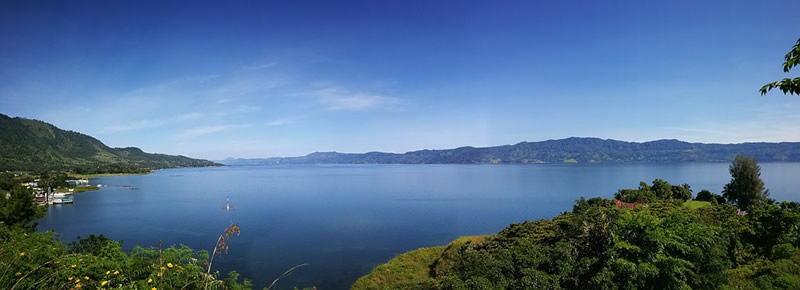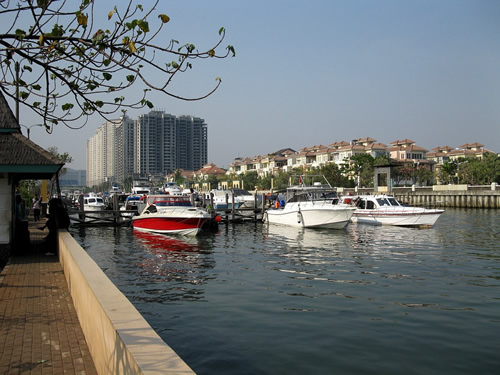Working and Living in the Spice Islands
Inside Tips on Teaching English in Indonesia
By Wayne Johnson

|
| Lake Toba, Sumatra, Indonesia |
“But, aren’t you scared of the bombs and terrorists?” said my friend when I announced I was leaving my job in South Korea to move to Indonesia.
Unfortunately, this can be an all too familiar question when you announce to your friends or family that you are going to live and work in Indonesia. But, despite the dramatic travel warnings and negative press about the
country, Indonesia really is a hidden gem and what’s more, one which offers good wages and a high standard of living.
I had long wanted to visit this archipelago of 17,000 islands, filled as I was with images of Komodo Dragons, Sumatran jungles, and exotic Balinese beaches. Even the names of the islands, Java, Sumatra, and Sulawesi conjured
up images of adventure.

|
| Harvesting in the rice fields of Bali. |
So you could say I was a little bit shocked when I was first confronted by the polluted, dirty, crowded megalopolis that is Jakarta. Nothing could be further removed from the Indonesia of my imagination. So you may be asking
yourself, why I am still here after nearly three years?

|
| Jakarta seen from the harbor. |
There are three reasons:
- the people
- the way of life
- the work
Few are the countries in the world where for $400 a month you can live in a house or apartment with a swimming pool, tennis courts, a maid, and a driver. And what is even more amazing is that it is all easily affordable on
a teacher’s salary.
Teaching Jobs in Indonesia
There are three kinds of teaching jobs available here, with most of them being in Jakarta. The language schools such as English
First (EF): Indonesia offer a good entry point for those with limited or no teaching qualifications and little teaching experience, but the drawbacks are that they pay relatively low wages and require evening and weekend work. On the opposite end
of the scale are the international schools with higher rates of pay and the requirement that the teacher has a teaching qualification from their home country. However, in Indonesia there is a third option — the fee-paying National
Plus schools which follow an international and local curriculum. There are scores of these schools, and native English speakers are in high demand because most of the school programs are delivered in English. Salaries at these schools start
at around USD 1,500 but can often top USD 2,000 after tax. Bearing in mind that a good salary for an Indonesian graduate is US$300 per month and you can see what a good deal that represents. Experience teaching either IGCSE (International
General Certificate of Secondary Education) or IB (International Baccalaureate) programs is an advantage, but not essential. Previously it was difficult to get these jobs if you were outside the country, but increasingly
schools are recruiting directly from overseas.
In National Plus schools it is highly likely that the vast majority of your students will be ethnic Chinese Indonesian. These students will often
come from very privileged backgrounds and often are not used to following rules, coming as they do from environments where they have maids and drivers ready to do their every bidding. You may also sometimes find a lack of willingness to study
(particularly boys) as often they know that no matter what their final results are, they will have a job in the family business when they finish. They can also be over-protected, with even students of 16 and 17 never having been allowed to spend
a night away from their parents. Having said that though, the positives definitely out-weigh the negatives, Indonesian students are on the whole very polite and welcoming to teachers (particularly in Primary schools) and even the unruly ones
are not nearly as bad as what you might expect to find in a western school. I have also found that when they are allowed to perform tasks or activities that allow them to be more independent they revel in the opportunity. Some good examples of
this include forming sports teams or taking them on an over-night camping trip. In their social circle study takes precedence over sport and other activities, which means that the students get stressed and tired easily due to their heavy study
load. If you want a sure-fire way to make yourself popular and to keep the students interested, then you will need to introduce fun activities into the classroom to help alleviate their stress.
Like anywhere in the world of English teaching, it is important to do your research before embarking on your new job. Employers and employment practices may not be like what you are used to in the west. Corruption is endemic
in Indonesian society and there is still a deferential culture to bosses, no matter how hair-brained some of their decisions may seem. And while I would never recommend staying silent if you disagree with something you experience, bear in mind
that shouting and arguing in general is frowned upon, particularly in Java. However, despite the chaos of Jakartan life Indonesians tend to be kind and friendly people who rarely get angry, and they are only too willing to offer a warm welcome
to those who decide to make their country their home.
Working in Indonesia
Your working hours will begin around 7 a.m. and typically finish between 3 p.m. and 4.00 pm. The students usually go home around 2.30 p.m. with only a one hour break for lunch and recess. A good school will give you
a teaching load of about 15 hours a week (although there do exist some horrific jobs out there that will expect much more), with the expectation that the remaining time is used for preparation and marking. You will also be expected to undertake
at least one after-school activity, which can range from basketball to photography to writing – depending on your skills and enthusiasm. Something else to also scrutinize carefully before accepting any job is the requirement for weekend
work. The good schools will only expect you to attend a handful of Saturdays a year for events such as general meetings and sports days. The less reputable outfits will treat Saturday as a valid working day which can be used at any time
and for any reason. Check the wording of your contract carefully. And now the good news – expect at least eight weeks holiday a year plus national holidays and also a 13th month bonus to be paid at the end of the year. Contracts are
typically for one year (renewable), but some schools offer two year options.
Living Essentials in Indonesia
Transport
Taxis: These are everywhere, with the bluebird company being the favored choice for expats. A typical 30 minute journey will cost around USD 4.
Buses: Local buses, while cheap, are crowded and hot and you will become an object of curiosity if you decide to join the locals on them. However, there is the brand new busway, whose buses have their
own supposedly traffic free lanes and are air-conditioned.
Motorcycles: They are everywhere and are very cheap. Many teachers find them convenient to beat the traffic and to get around easily. A typical down payment will be around USD 400 with monthly payments
around USD 30.
Accommodations
Many schools offer housing as part of their package for expat teachers, but make sure you check whether it is shared or not. If you would rather find your own then there is no shortage of good accommodations to be found.
Many expats prefer to live in apartment blocks due to their facilities (swimming pool, gym, etc.), security, and location. A typical apartment can range anywhere from USD 300 to USD 1,000 p.c.m. (per calendar month). Houses are usually
cheaper, although you will usually have to pay a year’s rent in advance and they are often unfurnished. A three bed-roomed house outside of the centre will cost between USD 2,000 to USD 2,500 per year. The other option, other than
sharing accommodations, is to stay in a Kost (boarding house), which range in quality from basic to deluxe. These offer monthly room rates and include cleaning and laundry services, but they often have rules preventing outside
guests staying over and you may have to share a bathroom. A typical cost for a Kost is USD 200 to 300 p.c.m.
Food and Drink
If you choose to live like a local and eat and drink at roadside cafes and family restaurants, then your daily expenditure will be very low — typically less than USD 5 a day. This will substantially increase though if
you choose to eat in chain restaurants in the malls or visit cafes, bars, and restaurants catering to the expat market, which tend to be in the south of the city, particularly in an area called Kemang. However, there are cheaper places
such as the backpacker hang-out of Jalan Jaksa, which unfortunately has seen better days. One item which is substantially more expensive than in other south-east Asian countries is alcohol. Culturally, Javanese are not heavy drinkers and
while they do not frown on others drinking, you will find many people have never or have no intention of drinking. Consequently, many places are alcohol free and the cost of drinks compares with that in the U.S. or Europe.
Resources
Living in Indonesia for Expats
Indonesia-Tourism.com |
Wayne Johnson comes from a town in the north of England and after graduating from University moved into a career in journalism. After experiencing the bright lights of London for eight years and working
on various magazines and internet sites, he decided to travel across Asia and now resides in Indonesia where he works as a freelance journalist and teacher and when not working indulges in his favourite past-times of football and travel.
|
